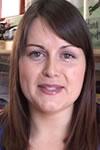
Ask me a question...
What were the main 'career decision' milestones in your life so far?

The only milestone in my life that led to my present career was the need to work to support my family. I left school at 16 and got married the same year, so I didn't give myself time to consider a career. The only work that I had ever done was that same year doing holiday work in a hospital in Dublin. That time you could work in the Health Service at 16, that is apart from working at home and rearing my family.
Who are the people who most influenced your career direction?

My mother had worked as a nurse all her life and this is how I got my Summer job that year, so this is the only real influence I had.
How did you go about getting your current job?

My current job is a Health Care Assistant. I have worked for the Health Service for the last 20 years as an attendant. Up until the last year an attendant was the only non-nursing role within the hospital. All non-nursing roles were classed as attendants. This role consisted of some care of the clients, cleaning and some catering duties.
In the last few years the national strategy within the Health Service was to break up this group of staff into three distinct roles, Health Care Assistants, Catering Staff and Household Staff in order to provide a better service to the clients using the service. The staff working at ward level were given the option of which group of staff they wished to be part of. The role of Health Care Assistant was determined by staff who had completed the Health Care Assistant's course, staff undergoing the course and then seniority of staff.
My role for the last 20 years was as an attendant within a kitchenette at ward level. I have completed a Skills VEC FETAC Level 5 Course Modules including: Communications, Care Support, Food Preparation and Service, Legislative Procedures & Quality, Nutrition, Work Experience, Infection Prevention and Control and Stock Control and Material Systems.
I wanted to return to the caring role so I opted for the Health Care Assistant's role.
Describe a typical day?

I work in Unit 1 of the hospital. On a typical day working in the unit we have a Clinical Nurse Manager 1, four staff nurses and either three or four Care Assistants, one Household Assistant and one Catering Assistant and we have thirty six clients.
Work starts at 7.45am with the morning report, at 7.55am we assist clients who need help to sit up for breakfast and then we assist them to eat their breakfast. At about 8.45am we collect the dirty dishes and leave them on a table for the catering staff to collect. We then proceed to assist clients with their their toileting, washing and dressing needs, making beds and ensuring that clients are warm and comfortable for the day. Some clients go for physio and some are brought up to the hairdressers to get their hair done and some go up to the Activities Nurse to do activities.
Following a 15 minute break, we ensure we have all the clients settled for the day. Then we fill in their care plans and then bring the dirty laundry to the laundry and dispose of any waste. We then clean the client's bed tables and their lockers.
At 11.30am the clients get their soup, milk or tea whichever they prefer, we assist any client who needs help with their soup. At 12pm the clients get their dinner, again we assist anyone who needs help. At about 12.30pm we collect the dirty dishes onto a table for the catering staff and clean the bed tables and the table in the day room, then we assist clients with their toileting needs and assist clients who wish to go back to bed.
In the afternoon we continue to assist clients back to bed, or give care to clients who are in bed. During the day we make sure to give drinks to clients who are in bed or who are not able to take drinks themselves. If time permits we might bring clients for a walk around the hospital or if it was a good day out into the hospital grounds or garden.
We try and take time to read or write letters for clients who wish us to do this or to sit and talk to clients who are upset or just feeing lonely. At 4.15pm we start getting clients ready for their tea at 4.30pm, again we assist anyone who needs help to eat their tea. We collect the dishes after the tea and clean the tables. Some of the staff go home at 5pm and that leaves two staff nurses and two health care assistants on duty until 8pm.
During the evening we assist clients back to bed, give care assistance to clients who are in bed, put on televisions for clients in their wards, bring soiled laundry to the laundry and dispose of any waste. At 7.30pm we give extra supplements to clients who need extra nourishment and who can't take them themselves. At 8pm the night staff come on duty and we go home.
What are the main tasks and responsibilities?

- Assisting residents with their hygiene needs, such as, bathing, hair care, shaving, dressing and undressing.
- Pressure area care.
- Helping those who need help at meal times.
- Ensure dietary needs are adhered to, including special diets and supplementary drinks under the direction of the nursing staff. Report to nurse in charge if any client is not eating/drinking.
- The mobilisation of clients including, assisting the nursing staff to turn and re-position using the appropriate aid, i.e. Hoist, sliding sheets etc. Help those who need help with walking and limb exercises as directed. Ensure clients are comfortable in bed or in chairs.
- Recording care plans, vital signs and fluid balance as necessary.
- Escort clients within and in some circumstances outside the hospital.
- Reporting to nursing staff any complaints of pain, distress etc. from clients.
- Cleaning and restocking of linen presses/wardrobes and ensure personal clothing is in the correct locker/wardrobe. Ensure correct laundry bags are used, tied and labeled and brought to laundry.
- Care of the unconscious client and assisting with the Last Office and with the preparation of the deceased for transfer to the mortuary.
- Care of the incontinent clients, promoting continence awareness among Clients who are confined to bed with their toilet needs.
- Toileting of clients to include giving, removing and emptying of bedpans, urinals and commodes and the use of bedpan washer disinfector. Reporting on clients bowel function as appropriate Oral and eye care.
- Dispose of waste including clinical waste.
What are the main challenges?

The main challenges are the changes that are taking place within the Health Service, everyone has to be more accountable for the decisions they make while they are working in a hospital environment. All grades of staff have to be aware of all the work policies and the correct procedures to be followed while at work.
Up until the last few years attendants didn’t need any formal training, they were just there to assist the nursing staff but now they need to be trained and they have to take responsibility to ensure that clients get the care and attention that they are entitled to. Policies are changing all the time so you need to keep updated on them. This means taking time to read and understand them and the affect they have on your role at work.
What do you like most?

Cool is not a word I would really use in relation to my work, but what I like about my job is working within a team, having a say in how my work is done.
We have a good partnership committee at work and this allows us to have an input into the changes that are taking place and how they affect us in our working lives. As one of the union shop stewards I have always had some input, but partnership gives more of my colleagues a chance to have their say. This is a very good development because for years our group of workers have felt that they had no input into the work of the hospital and partnership has given a real sense of having some ownership regarding our work.
Is there anything that isn't great?

The things that are not cool but are necessary aspects of the job are dealing with bed pans, commodes, cleaning up after clients have had a toiletry accident or have vomited, smells can be bad sometimes. Dealing with the death of clients, most of our clients are long stay residents and you get to know them and their relatives very well, so this is not one of the nicest parts of the job.
What particular skills do you bring to your workplace?

The skills that I bring to my workplace are good communications skills, listening skills, empathy, good work practices, skills on how to control and prevent the spread of infection, team working skills, working on your own initiative.
What subjects did you take in school and how have these influenced your career path?

English, Maths, Irish, French, History, Geography, Home Economics, Commerce (now called Business Studies) - these were subjects that I did for my Inter Cert, (now the Junior Cert), I left school after this. The courses that I took that had career implications were English, Maths, Commerce and Home Economics.
The implications of these were that English is needed for communication, Home Economics prepares one for life experiences and Commerce gives one an understanding of budgets and financial constraints. The subjects are practical ones and have helped me in my career. In hindsight I would have gone on to do my Leaving Cert and would have done Biology as this would have given me a basis to go further with my career, such as studying for nursing.
What is your education to date?

- Inter Cert (now Junior Cert)
- Manual handling twice a year
- Fire drills - two every year, fire control and prevention skills
- Vec FETAC Level 5 Modules; Communications, Care Support, Food Preparation and Service, Legislative Procedures & Quality, Nutrition Work Experience, Infection Prevention and Control and Stock Control and Material Systems.
- 2.2 Honours Degree Business Studies (Industrial Relations / HR )
- 2003 UCD Diploma Business Studies (Industrial Relations / HR )
- 2001 UCD Lay Tutoring Course (SIPTU) accredited by NUI Galway. Basic Diploma 1999.
- E.C.D.L Training and Development Course
What aspects of your education have proven most important for your job?

The Skills VEC FETAC Level 5 Modules; Communications, Care Support, Food Preparation and Service, Legislative Procedures & Quality, Nutrition, Work Experience, Infection Prevention and Control and Stock Control and Material Systems have proven the most important for my job and the Manual handling courses.
The ones that stood out as been particularly relevant for my job are, Communications, Care Support, Nutrition, Work Experience, Infection Prevention and Control and the manual handling course. I have also found the ECDL course to be important as I use the computer at work for work relating to the committees I am on.
What have been the most rewarding events in your career so far?

The most rewarding events in my career so far are:
- being the union representative at work as this shows that my colleagues at work respect me to work on their behalf.
- being the Co-Chair of the Partnership Committee at work and being a member of the PCCC Partnership Committee, I feel that this gives a real voice within the organisation for my colleagues, myself and the clients in the hospital to bring about change that benefits all.
What personal qualities do you have that helps you in your career?

The personal qualities that help me in my career are good communication skills, listening skills, empathy with the clients and other members of staff. I think that I have a very caring nature that includes warmth, patience and a need to feel that I am making a difference to other peoples lives. I am very ambitious and really love to be recognised for the efforts I put into my work.
What is your dream job?

My dream job would be working as Human Resource Manager within the HSE. I feel that I have the education and the skills to do this type of job, the only thing I lack is the experience. I also think that I am very good at dealing with people.
I understand the need for change within the Health Service and I also understand that you need to bring about this change through partnership, talking to people, understanding their fears and helping them to understand the need for change and giving them a role to play in how this change is implemented.
Does your job allow you to have a lifestyle you are happy with?

My job gives me security, it has helped me to be able to afford to build my house. I have been able to go on holidays and enjoy time with my family, but sometimes the unsocial hours have a real impact on family life, such as working on Christmas Day or other bank holidays when the rest of the family are all off work or school.
Unfortunately unless you want to go on to be a nurse there are no progression opportunities within my grade of staff within the hospital where I work.
What advice would you give to someone considering this job?

The advise that I would give to someone considering this job is to do their Leaving Cert and do the Transition year as this would give an opportunity to get some job experience or do some voluntary work within the community.
Do a Level 5 FETAC health related course. The skills and qualities that are needed to do this type of work are a real sense of caring for other people, communication skills, listening skills, be able to take and give constructive criticism without causing or taking offence, patience a willing to give your best effort to your work.
What are the three most important personal characteristics required for the job?

A caring nature, patience, empathy.
What is your favourite music?

Country and Western Ballads
What is your favourite film?

Madame X
What is your star sign?

Capricorn
Have you undertaken, or do you plan to undertake any further training as part of your job?

I have undertaken further training as part of my career. In the last year I have participated in a FETAC Level 5 Course and I hope to do the courses on Activities of Living and Care Skills and any other courses that are provided by the Health Service.
What kinds of work experience would provide a good background for this position?

Voluntary work within a hospital setting or in a private home of a sick or incapacitated person. Doing a work experience within the same areas. Being a carer at home.
- Career Development?
- Current Job?
- Education and
Training?
- Personal Qualities?
- Advice for Others?








